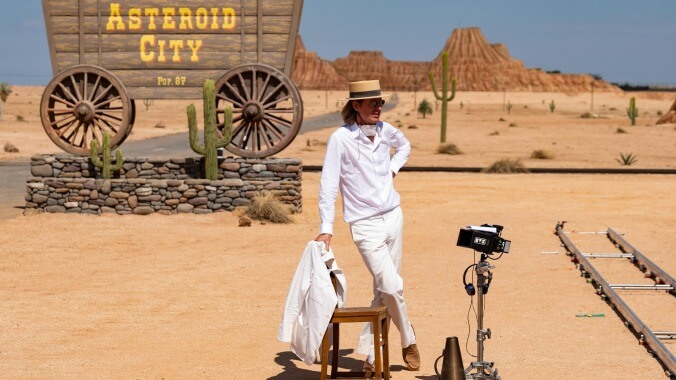Cannes critics Cannes’t believe how good Asteroid City is
Wes Anderson turned the Cannes Film Festival into the Asteroid City appreciation society

“It’s Wes Anderson’s most Wes Anderson movie yet,” according to the reviews of every Wes Anderson movie made since 2004. It’s a burden being one of the few auteurs with a confident handle on their aesthetic, but Anderson, whose latest, Asteroid City, is getting raves out of Cannes, where it premiered Tuesday, doesn’t seem to mind much. What other movie would we want him to make if not a Wes Anderson one? He likes his color-coded dioramas populated with tortured introverts who organize their lives to protect themselves from the persistent insecurity and unpredictability of life, and so do his fans. When it comes to Asteroid City, so do the critics.
But Anderson’s work has taken something of a dip, critically, since The Grand Budapest Hotel—though it should be noted that The A.V. Club rightly named his French Dispatch the best film of 2021. However, for those at Cannes, it’s a return to form. IndieWire’s David Ehrlich, in his “A” review, called the film Anderson’s “best effort since The Grand Budapest Hotel, and in some respects, the most poignant thing he’s ever made.“ Former A.V. Club contributor Esther Zuckerman agreed with his assessment in her Daily Beast rave, adding Asteroid City is “a thoroughly hilarious piece that coalesces into something almost haunting.” She continued, “The screenplay is one of Anderson’s funniest, and yet a darker thread courses through it.”
That screenplay often comes up in these reviews, focusing heavily on Anderson’s metatextual nesting doll framing device, which recalls Budapest, Royal Tenenbaums, and French Dispatch. Asteroid City, per the reviews, is about a play within a teleplay within a movie production—it’s also a movie that we audiences watch. As Zuckerman put it, this “meta scaffolding” is more than an “Andersonian quirk.” Rather something “intentionally unsettling.”
However, not all critics were as moved. Three decades of Wes Anderson movies have primed all of us for the simple fact that his idiosyncrasies bounce off some. The Wrap’s Steve Pond found Anderson’s narrative layering alienating—pun intended because the movie is about aliens! “It looks amazing,” Pond writes, “but it might well be the least involving movie he’s ever made, with an amazing cast providing little but momentary distraction.” Considering all the reviews we read for this round-up discussed the heaping helping of artifice Anderson pounded into his Asteroid, it’s not hard to imagine that being the case. Nevertheless, while Pond was unmoved, Vanity Fair’s Richard Lawson likened the experience to “what it was to first see a Wes Anderson film, surprised and delighted by its singular vision of life on Earth.”
Asteroid City’s cast is also getting acclaim, particularly Scarlett Johanssen, whom Zuckerman calls “never better,” and Ehrlich, “in full control of her own star power.” Anyone who’s seen the trailer can tell you that the cast list for this movie is comically long, but Lawson assures readers that Anderson “somehow” gives his ensemble “their due.” The small stories that make up Asteroid City, he writes, “present a mural of everyday humanity, all its quiet passion and accidental humor.”
Those human qualities, along with Anderson’s own human gifts, likely caused all these reviewers to call out the inane A.I. generated mimicry that’s turned the director’s work into “a trend,” as Zuckerman puts it. But Ehrlich calls out cinematographer Robert Yeoman’s camerawork “the sort of transformative moment that A.I. could never dream up no matter how much data it ingested.” What can we say? All that A.I. stuff sucks. Do you know what doesn’t? Actual people making art that expresses their lived experiences.
“Anderson’s obsessively constructed dioramas explore the very human need to organize, quantify, and control our lives in the face of the unexpected and the uncertain,” writes Vulture’s Bilge Ebiri. “Asteroid City might be the purest expression of this dynamic because it’s about the unknown in all its forms. Death, the search for God, the creation of art, the exuberance of love, the mysteries of the cosmos — in Anderson’s telling, they’re all facets of the same thing.”
Asteroid City beams into theaters on June 16.